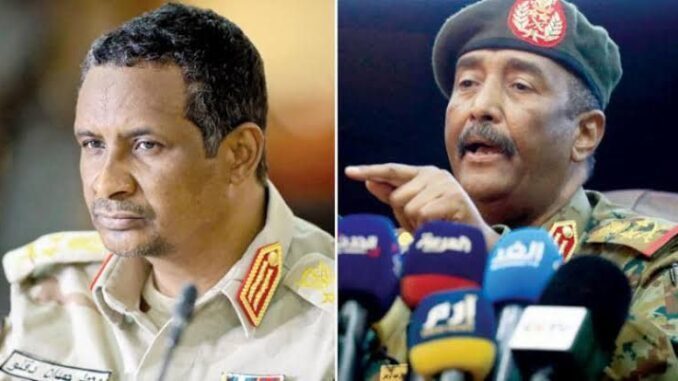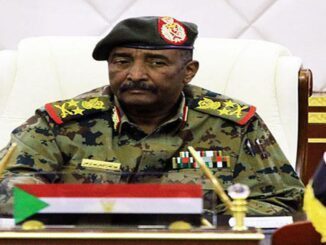
Israeli officials are reportedly concerned that the current dispute in Sudan could end prospects of a likely peace treaty between Israel and Sudan.
Israel is using its relationships with the generals leading the Sudanese military and paramilitary Rapid Support Forces (RSF) group to urge them to immediately end the fighting that has left more than 270 people dead, Axios reported, citing three Israeli officials.
Israel’s normalization process with Sudan in the last three years and the relationships it built with both Army chief General Abdel Fattah al-Burhan and RSF leader General Mohamed Hamdan Dagalo, known as Hemedti, put it in a unique position to try to influence the two warring generals.
Many reports indicate that Israeli officials are highly concerned that the current fighting will devastate the country, prevent the formation of a civilian government, and end any prospects for a peace agreement between Israel and Sudan.
Sudan was part of the Trump-brokered Abraham Accords between Israel and several Arab countries in 2020.
But the military takeover of Sudan a year later led to the suspension of U.S. aid and the freezing of the normalization process between Israel and Sudan.
The Israeli Foreign Ministry in recent years has been engaging with al-Burhan on the normalization process, and the Mossad intelligence agency has been engaging with Hemedti on security and counterterrorism issues, Israeli officials said.
Before the fighting began, Israeli officials said they were closely following the talks in Sudan about the framework agreement that was supposed to lead to the appointment of a civilian-led government.
When Israeli Foreign Minister Eli Cohen visited Khartoum in February, he urged al-Burhan to move forward with giving power back to a civilian government and made it clear that it will be difficult to reach a peace treaty without it.
A senior Israeli official said that last week the Israeli government was sure that an agreement on appointing a civilian government was coming in days, if not hours, and was frustrated when the deal fell apart and the fighting began over the weekend.
Israeli officials said that the White House and State Department on Sunday urged Israel to help in pressing the two warring generals to agree to a cease-fire. Israeli Foreign Ministry officials spoke to al-Burhan’s side, while officials from Mossad spoke to the Hemedti side and urged both to de-escalate.
“We are following with concern the events in Sudan. Israel wants stability and security for Sudan,” an Israeli Foreign Ministry spokesperson said.
“Israel calls on all parties to refrain from violence and to return to the path of internal reconciliation, in order to conclude the process of governmental transition with a large consensus.”
Israel is just one of several countries that have interests in Sudan and have been involved in the political situation in the West African country, including in the current crisis.
Saudi Arabia, the United Arab Emirates and Egypt are deeply involved in Sudan. Hemedti accused Egypt of colluding with al-Burhan and sending fighter jets and soldiers to help the Sudanese military. Egypt denied the allegations and said its forces were in Sudan for a joint military exercise.
Saudi Arabia and the UAE have been a destination for many Sudanese political leaders in recent years. Both countries are also part of the “Quad for Sudan” group, which includes the U.S. and U.K. as well.
Other countries and international organizations, including Norway, the UN and the African Union are also involved in the situation in Sudan.
Russia also has interests in Sudan. According to several reports, the Wagner mercenary group is involved in gold mines in the country. A day before the Russian invasion of Ukraine, Hemedti visited Moscow and met Russian officials.
The Israeli official decision was not to take sides in the crisis and not get involved in any mediation efforts other than urging a cease-fire, the three Israeli officials said.
“But the officials added that they think the best way to stop the fighting is for the African Union and several of Sudan’s neighbors to urgently send a delegation to Khartoum and start diplomatic talks and give guarantees to both sides that will convince them to stop fighting,” the Axios report concluded.



